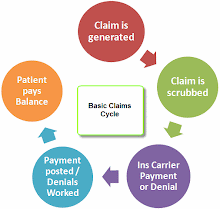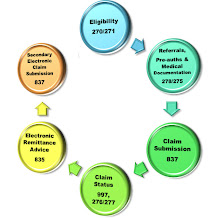Professional Liability Errors and Omissions Insurance for Medical Billing Services
Do medical billing services, individual medical billers and certified coders require Professional Liability Errors and Omissions Insurance coverage to perform their job duties?
Professional Liability Errors and Omissions Insurance coverage helps to protect your business or company services from claims submitted by your clients.
Let's say you are a medical billing service and the doctor sends you $120,000 worth of Aetna medical claims. You are required to bill a clean CMS 1500 claim to Aetna within 90 days from the date of service (per doctors contract with Aetna) and you have issues getting a clean CMS 1500 medical claim sent through the electronic medical claim clearinghouse software. Your medical billing staff didn't realize they could drop the claims to a CMS 1500 form and bill it by paper so the claims sit their denied at the medical claim clearinghouse, waiting for someone to fix the issue.
95 days later you finally get the medical claim clearinghouse working and all CMS 1500 electronic claims are submitted to the carrier and denied for untimely filing. Your billing service can't appeal (although it doesn't hurt to try) because you can't prove you sent Aetna Health Insurance a clean CMS 1500 medical claim in the timely filing period.
Now let's say the doctor was expecting to collect about $73,000.00 from Aetna on the $120,000 worth of medical claims. The doctor is mad when he finds out that he just lost $73,000.00 in business and decides to sue you for this loss.
The Professional Liability Errors and Omissions Insurance Coverage can potentially protect you from most of these fees including court, attorney and lawsuit settlement fees.
Does a Medical Billing Service require Professional Liability Errors and Omissions Insurance - no but would it help out to cover the costs of protecting your business in the case of being sued by a doctor? Yes.
Who needs Professional Liability Errors and Omission Insurance in the medical industry? Anyone who performs "services" to a client. Services can be anything from billing, coding, doing work in a "timely" matter.
General Liability Insurance does not protect your business for errors, contract performance disputes, or any other professional liability issues which is why they have Error and Omission insurance.
Some states do not require providers to have Medical Malpractice Insurance although most doctors do have Medical Malpractice Insurance.
Employment Practices Liability Insurance or EPLI insurance is insurance policies to protect employers from employees, former employees or "potential" employees. If employees feel discriminated against for their age, sex, race, disabilities, sexual harassment or wrongful termination you may find the need for EPLI insurance.
Keywords: Medical Billing Insurance, Certified Coders insurance, Insurance polices for medical offices, insurance policies for medical billing services, when to buy, do I need to buy, purchase, insurance policies, medical industry, medical billing companies, corporations, businesses, employed, employer, small businesses, health care, providers, doctors, nurses, assistants, biller, collector, collecting, collections, doctor error, erroneous,


the physican cannot expect to get paid the full price billed to the insurance, normally its 70-100 % of the ins- liable rate, depends if the physican is in net -work or out of network.
ReplyDeleteHi,
ReplyDeleteI appreciate your comments as this was more of a generic scenario to give people a visual if they needed this kind of insurance or not.
You are right depending on the doctors specialty, Taxonomoy code, State patients were treated in, Allowable Amounts contracted with Aetna the reimbursement rates can all vary.
I was trying to make a point that the doctor charged $120,000.00 and was expecting to collect $73,000 from the insurance allowable amounts - which means that the patients would most likely have copays, coinsurance or deductible amounts but if the doctor didn't supply a clean claim he wouldn't be able to go after the patient for those balances.
In short the doctor would have to write off $120,000.00 in charges.
If the doctor was out of network and Aetna didn't pay he could go after the patients without any issues since he's not contracted with Aetna and wouldn't be responsible for writing off the balance.
Thanks for the comment!
what type of training did you recieve to qualify for this billing and coding position? what type of qualifications and experience do you look for in applicants for this position? what is the average pay scale for b illing personnel? what is the average turn around time for payment of insurance claims? At any given time, typically, what percentage of your Accounts Recievable is waiting to be billed, has been billed but is waiting for payment, and is actually paid? DoesMedicare take more or less time to pay claims than other insurance carriers? what special considerations have to be made for Medicare patients? Is there a specific Medicare representative at your facility? How does your facility handle adjustments, write-offs, charity cases, low income, collections, and other non-traditional billing concerns? How often are superbills (encounter forms, charge sheets, etc.) updated? How often do you have to refer to the CPT book, the HCPCS book, or the ICD-9 book?
ReplyDelete